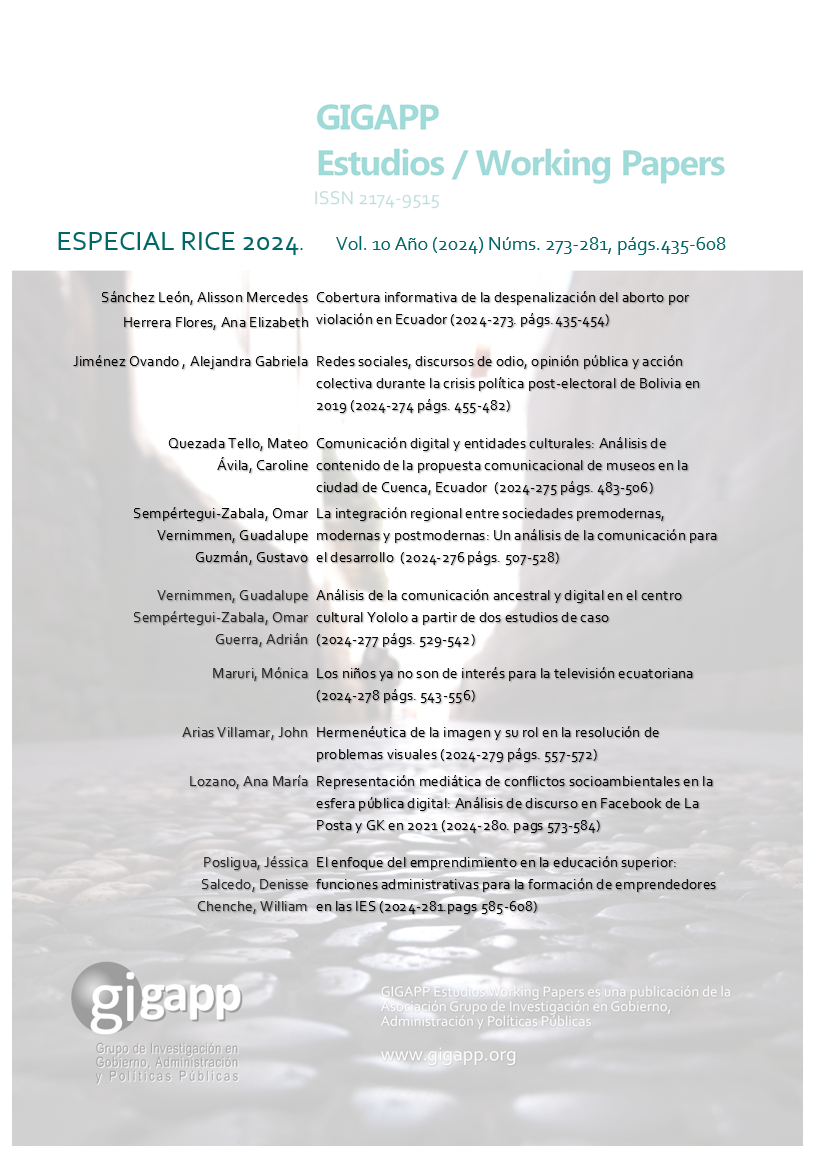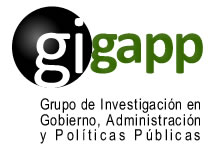El enfoque del emprendimiento en la educación superior: funciones administrativas para la formación de emprendedores en las IES
Resumen
La economía ecuatoriana demanda nuevas alternativas de desarrollo y uno de los medios efectivos, es a través de la formación de emprendedores que tengan la necesidad de implementar negocios creativos e innovadores; lo cual permitirá reducir el alto índice de desempleo, constituyéndose en una fuente de ingreso estable para las familias, siendo este un impacto al crecimiento económico del país. En vista que vivimos en un mundo de constantes cambios, sobre todo en lo tecnológico, la educación moderna persuade a formar estudiantes con actitudes e iniciativa emprendedora, lo cual debe impartirse en todas las instituciones de educación superior, con el fin de integrar nuevos empresarios con sólidos conocimientos, sin descuidar las funciones administrativas para la formación de emprendedores exitosos, gracias al desarrollo y estímulo de la creatividad; y la motivación que son necesarias a la hora de emprender sus propios negocios. El objetivo de la investigación es dar a conocer el Enfoque del Emprendimiento desde la perspectiva e incidencia de las funciones administrativas para formar emprendedores dentro de las IES y su aporte para el emprendimiento sostenible. La investigación se fundamenta mediante el método inductivo-deductivo, en una revisión documental de diversos libros, artículos de revistas científicas, su metodología es de corte transversal, explicativo y descriptivo. La estructura se compone de una parte introductoria en donde se presenta la caracterización de las competencias emprendedoras a desarrollar; posteriormente se explica la metodología utilizada. Esta labor pretende evidenciar los esfuerzos institucionales que se vienen desarrollando en este sentido; promover el fortalecimiento de la educación en emprendimiento de las IES; y constituir un punto de partida para futuras investigaciones que pretendan medir el impacto de la educación en emprendimiento en los estudiantes de programas de pregrado y/o evaluar su incidencia en la iniciación y puesta en marcha de un proyecto emprendedor; y, finalmente se presentan las conclusiones del presente estudio. Los resultados obtenidos evidencian que las Instituciones de Educación Superior, están en un proceso de desarrollo del emprendimiento en sus estudiantes. El Gobierno considera a la educación como un factor transformador del desarrollo del país. La investigación deja un enlace hacia nuevos estudios, análisis y debates para investigaciones futuras.
Descargas
Citas
Bruna Q, F. (2010). Emprendimiento un Proyecto de Empresa. Bogotá: Ediciones de la U. Campoy M, D. (2010). Gestión Emprendedora . Bogotá: Ediciones de la U.
Caveda, D. A. (2013). El proceso de formación para la investigación jurídica". La Habana, Cuba: CECES.
Cobo, C., & Moravec, J. (2011). Aprendizaje Invisible, hacia una nueva Ecología de la Educación. España: COL-LECCIÓ Transmedia XXI.
De Zubiría Samper, J. (2010). Los Modelos Pedagógicos. Hacia una pedagogía dialogante. En J. De Zubiría Samper. Bogotá, Bogotá, D.C. Colombia: Cooperativa Editorial Magisterio.
González S, D. (2008). Psicología de la Motivación. La Habana. Griffin W, R. (2011). Administración. México D.F.: Cengage Learning. Jiménez, 2. (s.f.).
Jiménez, A. (2009). Reflexiones sobre la necesidad de acercamiento entre universidad y mercado laboral. Revista Iberoamericana de Educación, 50, 1-25. Fecha de consulta: 25/03/2011 http://www.rieoei.org/deloslectores/2895Vivas.pdf
Lasio M., 2004, Programa de Desarrollo de Emprendedores de la ESPOL. XVI Congreso Latinoamericano sobre Espíritu Emprendedor, Cali-Colombia.
Ley Orgánica de la Educación Superior-LOES. (2008). Art. (107).
Morlás E, C. (2015). Ecuador pais de emprendedores. Guayaquil. Noro, J. E. (2002). Investigación y Postgrado, 17.
Noro, J. E. (2016). Universidad, Escuela y Sistema educativo. Historia y perspectiva, 12. Robbins, S., & Coulter, M. (2006). Administración. México: Prentice-Hall.
Plan Nacional del Buen Vivir-PNBV (2013-2017). Objetivo dos: Fortalecer las capacidades y potencialidades de la ciudadanía. Recuperado de http://plan.senplades.gob.ec/web/guest/objetivo-2 el 25 de Septiembre de 2015.
Toledo C, M. (2012). Administración, Una Perspectiva Global y Empresarial. México D.F.: McGraw- Hill.
Uzcátegui, D. E. (1953). Páginas de Cultura y Educación. Quito: Imprenta de la Universidad Central de Quito.
Vázquez, L., & Saltos, N. (2013). Ecuador su realidad Fundación de Investigación y promo-ción Social "José Peralta". Artes Gráficas Silva
Vega Soto, M. (2009). La actitud emprendedora. Recuperado el 3 septiembre de 2015, de http://www.degerencia.com/articulo/la-actitud-emprendedora .
Wompner G., F.H.: "Educación superior para el emprendimiento" en Observatorio de la Economía Latinoamericana 91, enero 2008. Texto completo en: www.eumed.net/cursecon/ecolat/cl/g
Yarce, J. (2013). Aprender a emprender. Recuperado el 10 de septiembre de 2015 de: http://www.degerencia.com/articulo/aprender-a-emprender
Zegarra, J. (s/f). La formación profesional en la universidad y el mundo del trabajo. Fecha de consulta: 30/03/2011. https://tinyurl.com/56uv5y2b
Derechos de autor 2024 Jéssica Posligua, Denisse Salcedo, William Chenche (Autor/a)

Esta obra está bajo licencia internacional Creative Commons Reconocimiento-NoComercial-CompartirIgual 4.0.
Aquellos autores/as que tengan publicaciones con esta revista, aceptan los términos siguientes:
a. Los autores/as conservarán sus derechos de autor y garantizarán a la revista el derecho de primera publicación de su obra, el cuál estará simultáneamente sujeto a la Licencia de reconocimiento de Creative Commons Attribution-NonCommercial-ShareAlike 4.0 International (CC BY-NC-SA 4.0) que permite a terceros compartir la obra siempre que se indique su autor y su primera publicación esta revista.
Con esta licencia de acceso abierto, los lectores (usuarios) pueden:
- Compartir — copiar y redistribuir el material en cualquier medio o formato
- Adaptar — remezclar, transformar y construir a partir del material
Bajo los siguientes términos:
-
Atribución — usarios deberán dar crédito de manera adecuada, brindar un enlace a la licencia, e indicar si se han realizado cambios. Puede hacerlo en cualquier forma razonable, pero no de forma tal que sugiera que usted o su uso tienen el apoyo de la licenciante.
-
NoComercial — usuarios no puede hacer uso del material con propósitos comerciales.
-
CompartirIgual — Si remezcla, transforma o crea a partir del material, usuarios deben distribuir su contribución bajo la misma licencia del original.
-
Sin restricciones adicionales: los usuarios no pueden aplicar términos legales o medidas tecnológicas que restrinjan legalmente a otros de hacer cualquier cosa que permita la licencia.
b. Los autores/as podrán adoptar otros acuerdos de licencia no exclusiva de distribución de la versión de la obra publicada (p. ej.: depositarla en un archivo telemático institucional o publicarla en un volumen monográfico) siempre que se indique la publicación inicial en esta revista
c. Se permite y recomienda a los autores/as difundir su obra a través de Internet (p. ej.: en archivos telemáticos institucionales o en su página web) antes y durante el proceso de envío, lo cual puede producir intercambios interesantes y aumentar las citas de la obra publicada. (Véase El efecto del acceso abierto).



